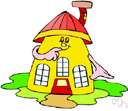small
(smôl)These adjectives mean being notably below the average in size or magnitude: a small house; diminutive in stature; little hands; a miniature camera; a minuscule amount of rain; minute errors; a petite figure; tiny feet; a wee puppy.
small
(smɔːl)small
(smɔl)adj.andadv. -er, -est,
n. adj.
small
– largeThe following adjectives are used to indicate how small or large something is. They are arranged from 'smallest' to 'largest'.
- microscopic, infinitesimal...microscopic fibres of protein....mineral substances present in infinitesimal amounts in the soil.
- tiny, minute, miniature, diminutive, minusculeThough she was tiny, she had a very loud voice.Only a minute amount is needed.He looked like a miniature version of his handsome and elegant big brother.She noticed a diminutive figure standing at the entrance.Rolls Royce are still British-owned their sales are miniscule.
- small, littleThe window was far too small for him to get through.We sat around a little table, eating and drinking wine.
- medium-sized, average-sized...a medium-sized saucepan.Most average-sized women just aren't born to be ultra tiny.
- large, big, greatHe was a large man with thick dark hair.The car was too big to fit into our garage....a great hall as long and high as a church.
- huge, enormous, massive...a tiny little woman with huge black glasses.The main bedroom is enormous.There was evidence of massive fraud.
- vast, immense, gigantic, colossal...farmers who own vast stretches of land....an immense cloud of smoke.Britain faces a gigantic problem over the disease.There has been a colossal waste of public money.
small
– littleSmall and little are both used to say that someone or something is not large. There are some important differences in the ways these words are used.
Small can be used in front of a noun, or after a verb such as be.
Little is normally used only in front of nouns. You can talk about 'a little town', but you do not say 'The town is little'.
You can use words like quite and rather in front of small.
Don't use these words in front of 'little'.
You can use very and too in front of small.
'Very' or 'too' are not usually used in front of little when it is an adjective, except when you are talking about a young child. You don't say, for example, 'I have a very little car', but you can say 'She was a very little girl.'
Small has the comparative and superlative forms smaller and smallest.
The comparative form littler and the superlative form littlest are mostly used in spoken English and to talk about young children.
You can use other adjectives in front of little.
Be Careful!
You don't normally use other adjectives in front of 'small'.
| Noun | 1. | small - the slender part of the back body part - any part of an organism such as an organ or extremity |
| 2. | small - a garment size for a small person size - the property resulting from being one of a series of graduated measurements (as of clothing); "he wears a size 13 shoe" | |
| Adj. | 1. | small - limited or below average in number or quantity or magnitude or extent; "a little dining room"; "a little house"; "a small car"; "a little (or small) group" big, large - above average in size or number or quantity or magnitude or extent; "a large city"; "set out for the big city"; "a large sum"; "a big (or large) barn"; "a large family"; "big businesses"; "a big expenditure"; "a large number of newspapers"; "a big group of scientists"; "large areas of the world" |
| 2. |  small - limited in size or scope; "a small business"; "a newspaper with a modest circulation"; "small-scale plans"; "a pocket-size country" small - limited in size or scope; "a small business"; "a newspaper with a modest circulation"; "small-scale plans"; "a pocket-size country"limited - small in range or scope; "limited war"; "a limited success"; "a limited circle of friends" | |
| 3. | small - (of children and animals) young, immature; "what a big little boy you are"; "small children" | |
| 4. | small - slight or limited; especially in degree or intensity or scope; "a series of death struggles with small time in between" archaicism, archaism - the use of an archaic expression slight, little - (quantifier used with mass nouns) small in quantity or degree; not much or almost none or (with `a') at least some; "little rain fell in May"; "gave it little thought"; "little time is left"; "we still have little money"; "a little hope remained"; "there's slight chance that it will work"; "there's a slight chance it will work" | |
| 5. |  small - low or inferior in station or quality; "a humble cottage"; "a lowly parish priest"; "a modest man of the people"; "small beginnings" small - low or inferior in station or quality; "a humble cottage"; "a lowly parish priest"; "a modest man of the people"; "small beginnings"inferior - of or characteristic of low rank or importance | |
| 6. | small - lowercase; "little a"; "small a"; "e.e.cummings's poetry is written all in minuscule letters" lowercase - relating to small (not capitalized) letters that were kept in the lower half of a compositor's type case; "lowercase letters; a and b and c etc" | |
| 7. | small - (of a voice) faint; "a little voice"; "a still small voice" soft - (of sound) relatively low in volume; "soft voices"; "soft music" | |
| 8. | small - have fine or very small constituent particles; "a small misty rain" fine - of textures that are smooth to the touch or substances consisting of relatively small particles; "wood with a fine grain"; "fine powdery snow"; "fine rain"; "batiste is a cotton fabric with a fine weave"; "covered with a fine film of dust" | |
| 9. |  small - not large but sufficient in size or amount; "a modest salary"; "modest inflation"; "helped in my own small way" small - not large but sufficient in size or amount; "a modest salary"; "modest inflation"; "helped in my own small way"moderate - being within reasonable or average limits; not excessive or extreme; "moderate prices"; "a moderate income"; "a moderate fine"; "moderate demands"; "a moderate estimate"; "a moderate eater"; "moderate success"; "a kitchen of moderate size"; "the X-ray showed moderate enlargement of the heart" | |
| 10. |  small - made to seem smaller or less (especially in worth); "her comments made me feel small" small - made to seem smaller or less (especially in worth); "her comments made me feel small" | |
| Adv. | 1. | small - on a small scale; "think small" big - on a grand scale; "think big" |
small
little great, big, large, huge, massive, vast, enormous, immense, mega (slang), colossal, stellar (informal), sizable or sizeable
unimportant major, important, significant, serious, powerful, vital, urgent, weighty, appreciable
modest grand, large-scale
meagre substantial, generous, ample, considerable
"Small is beautiful" [Professor E.F. Schumacher title of book]
"The best things come in small packages"
small
adjectivesmall
[smɔːl]the dress is too small for her → el vestido le viene pequeño or chico
the smaller of the two → el menor (de los dos)
with a small "e" → con "e" minúscula
to have a small appetite → no ser de mucho comer, comer poco
to become smaller = to get or grow smaller
to break/cut sth up small → romper algo en trozos pequeños/cortar algo en trocitos
to get or grow smaller [income, difficulties, supply, population, amount] → disminuir, reducirse; [object] → hacerse más pequeño
mobile phones are getting smaller → los teléfonos móviles son cada vez más pequeños
until the small hours → hasta altas horas de la noche
to be small in size [country] → ser pequeño; [animal, object] → ser de pequeño tamaño; [room] → ser de dimensiones reducidas
in small letters → en minúsculas
this house makes the other one look small → esta casa hace que la otra se quede pequeña
to make o.s. small → achicarse
to make sth smaller [+ income, difficulties, supply, population, amount] → reducir algo; [+ object, garment] → reducir algo de tamaño, hacer algo más pequeño
the smallest room (euph, hum) → el excusado
to be small beer or > small potatoes (US) → ser poca cosa
it was small beer compared to the money he was getting before → no era nada or era poca cosa comparado con lo que ganaba antes
see also world A1
see also wee 1
to start in a small way → empezar desde abajo
to feel small → sentirse insignificante
to make sb look small → rebajar a algn
she said in a small voice → dijo con un hilo de voz
when we were small → cuando éramos pequeños or chicos
to be small comfort or consolation (to sb) → servir de poco consuelo (a algn)
to be of small concern (to sb) → importar poco (a algn)
to have small hope of success → tener pocas esperanzas de éxito
a matter of small importance → un asunto de poca importancia
see also measure A6
see also wonder A2
don't think too small → piensa más a lo grande
try not to write so small → intenta no escribir con una letra tan pequeña
small arms NPL → armas fpl ligeras de bajo calibre
small business N → pequeña empresa f
the small businessman N → el pequeño empresario
small capitals NPL (Typ) (also small caps) → versalitas fpl
small change N → suelto m, cambio m, calderilla f, sencillo m (LAm), feria f (Mex)
small claims court N → tribunal m de instancia (que se ocupa de asuntos menores)
small end N (Aut) → pie m de biela
small fry N to be small fry → ser de poca monta
small intestine N → intestino m delgado
small investor N → pequeño/a inversionista mf
small print N → letra f menuda
small screen N → pequeña pantalla f, pantalla f chica (LAm)
small talk N → charla f, charloteo m
to make small talk → charlar, charlotear
Position of "pequeño"
small
[ˈsmɔːl]a small amount of milk → une petite quantité de lait
to get smaller [number, amount] → diminuer; [swelling, lump, pile] → diminuer
to make sth smaller [+ amount, income] → diminuer qch; [+ object, garment] → rapetisser qch
He made a lot of small mistakes → Il a fait beaucoup de petites erreurs.
When I was small → Quand j'étais petit.
She has two small children
BUT Elle a deux jeunes enfants.
the small of the back → le creux des reinssmall ads npl (British) (in newspaper) → petites annonces fplsmall arms npl → armes fpl légèressmall business n → petite entreprise fsmall change n → petite monnaie fsmall claims court n → tribunal m d'instance (s'occupant d'affaires mineures)small fry n → menu fretin m
small
small
:small
:small
:small
[smɔːl]when we were small → quando eravamo piccoli
there was only a small audience → c'era poco pubblico
this house makes the other one look small → questa casa fa sembrare piccola l'altra
the smallest possible number of books → il minor numero di libri possibile
the smallest details → i minimi dettagli
to have a small appetite → avere poco or scarso appetito
in a small voice → con un filo di voce
to feel small (fig) → sentirsi umiliato/a or sminuito/a
to get or grow smaller (stain, town) → rimpicciolire (debt, organization, numbers) → ridursi
to make smaller (amount, income) → ridurre (garden, object, garment) → rimpicciolire
to have small hope of success → avere scarse speranze di successo
to have small cause or reason to do sth → non avere molti motivi per fare qc
to start in a small way → cominciare da poco
a small shopkeeper → un(a) piccolo/a negoziante